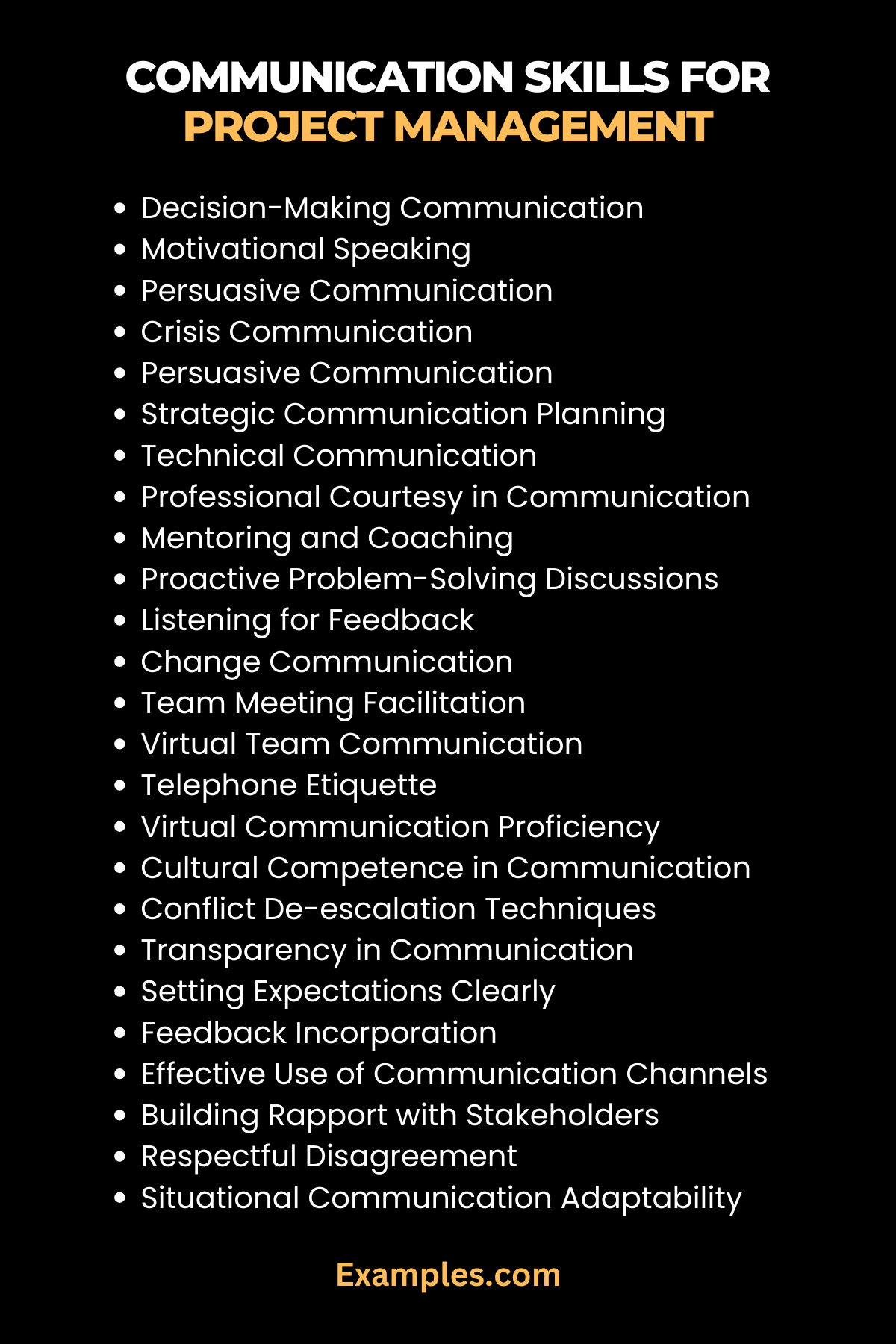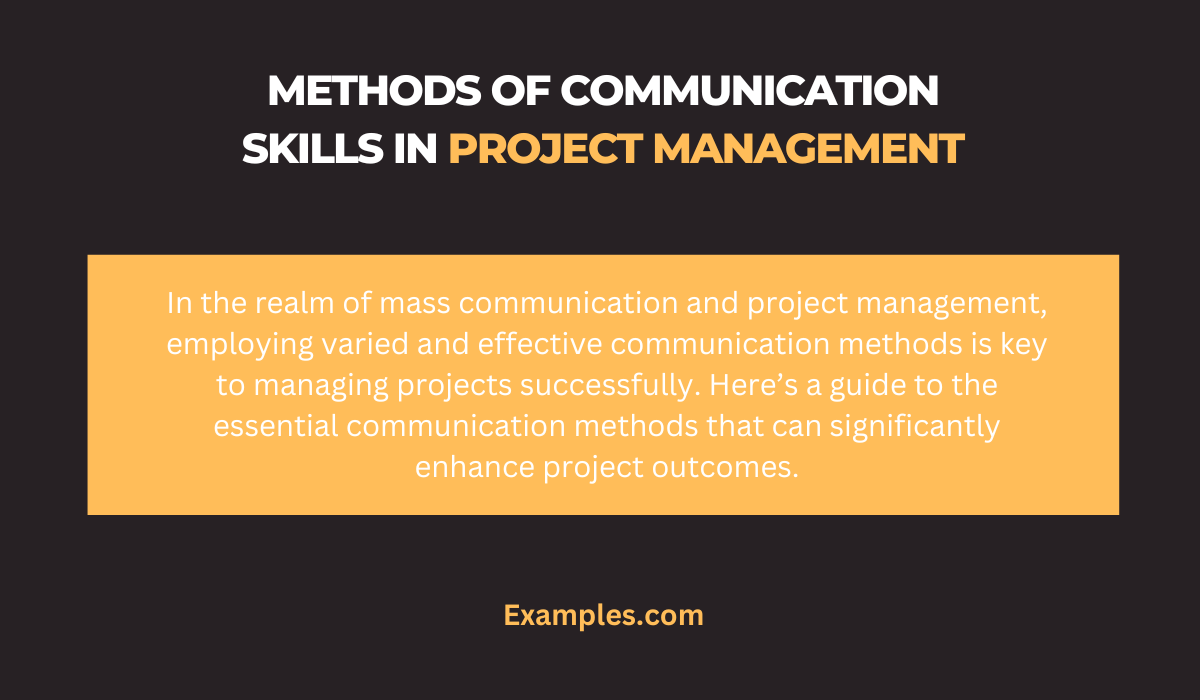29+ Communication Skills for Project Management Examples
Effective communication is the cornerstone of successful project management. This comprehensive guide delves into the various aspects of communication skills necessary for managing projects efficiently. We’ll explore the methods used in project management and the pivotal role communication plays, illustrating with examples from Communication Skills at Workplace and Effective Communication Skills.
30 Communication Skills for Effective Project Management
Enhancing communication skills is vital for successful project management. Here are 30 unique communication skills with distinct examples and explanations, tailored for project managers in communication skills and beyond.

- Decision-Making Communication:
Communicate decisions effectively to your team.
Example: “After considering all options, we will proceed with Strategy B for better results.” - Motivational Speaking:
Motivate your team through inspiring communication.
Example: “Your hard work is driving our project towards success, let’s keep up the great momentum.” - Persuasive Communication:
Use persuasive communication to align the team with project goals.
Example: “If we implement this change, it will significantly enhance our project’s efficiency.” - Crisis Communication:
Effectively communicate during crises to maintain team morale.
Example: “Despite these challenges, I am confident we can navigate this situation successfully together.” - Strategic Communication Planning:
Develop and communicate a clear strategic plan.
Example: “Our strategy for the next phase includes these specific steps to enhance our outcomes.” - Technical Communication:
Clearly convey technical aspects of the project.
Example: “The new software update will improve our data processing by incorporating these features…” - Professional Courtesy in Communication:
Maintain professional courtesy in all communications.
Example: “I appreciate your perspective on this; let’s discuss further to understand each other’s viewpoints.” - Mentoring and Coaching:
Provide guidance through mentoring communication.
Example: “Let me share some techniques that might help you manage your project tasks more effectively.” - Proactive Problem-Solving Discussions:
Initiate discussions to proactively solve potential issues.
Example: “I foresee a challenge here; let’s brainstorm proactive solutions.”

- Listening for Feedback:
Actively listen and respond to feedback from your team.
Example: “Your feedback is valuable; let’s explore how we can implement these suggestions.” - Change Communication:
Effectively communicate change within the project.
Example: “We’re adjusting our approach based on recent findings, here’s how it impacts our project.” - Team Meeting Facilitation:
Facilitate team meetings for effective communication.
Example: “In today’s meeting, let’s focus on finalizing our project milestones.” - Virtual Team Communication:
Master communication with virtual or remote teams.
Example: “Even though we’re not in the same location, regular virtual check-ins will keep us aligned.” - Cultural Competence in Communication:
Exhibit cultural competence in your communication.
Example: “Let’s schedule the meeting at a time that accommodates all time zones in our team.” - Conflict De-escalation Techniques:
Utilize communication techniques to de-escalate conflicts.
Example: “I understand there are differing opinions; let’s discuss this calmly and find a solution.” - Transparency in Communication:
Maintain transparency in project updates and decisions.
Example: “I’ll keep you all updated with any changes or developments as soon as they happen.” - Inclusive Communication Practices:
Ensure inclusive communication that values all team members’ inputs.
Example: “Everyone’s input is important; let’s make sure all voices are heard.”

- Setting Expectations Clearly:
Set clear expectations through your communication.
Example: “For this project phase, I expect timely submissions and thorough quality checks.” - Feedback Incorporation:
Incorporate received feedback into project planning.
Example: “Based on your feedback, I’ve adjusted the project timeline to be more realistic.” - Effective Use of Communication Channels:
Utilize the most effective communication channels for different needs.
Example: “For urgent issues, let’s use instant messaging; for detailed discussions, we’ll hold a meeting.” - Building Rapport with Stakeholders:
Communicate effectively to build rapport with stakeholders.
Example: “Understanding your expectations helps us align our project goals more closely with your vision.” - Presentation Skills for Stakeholders:
Present project updates compellingly to stakeholders.
Example: “In this presentation, I’ll highlight our project’s progress and upcoming milestones.” - Respectful Disagreement:
Handle disagreements respectfully.
Example: “I see your point, but let’s consider alternative perspectives as well.” - Constructive Critique:
Offer constructive critique to improve project outcomes.
Example: “This section of the project could be enhanced by incorporating these changes…” - Time Management in Communication:
Manage communication efficiently to respect everyone’s time.
Example: “Let’s keep our updates brief and focused to maximize our meeting time.” - Encouraging Team Participation:
Encourage equal participation from all team members.
Example: “I’d love to hear ideas from everyone; each perspective is valuable.” - Situational Communication Adaptability:
Adapt your communication style to different situations.
Example: “Given the sensitivity of this issue, I’ll take a more nuanced approach to our communication.” - Project Vision Communication:
Communicate the project vision to inspire and guide your team.
Example: “Our project has the potential to make a significant impact; here’s the vision driving it.” - Communication for Team Building:
Use communication to strengthen team bonds.
Example: “Let’s use our team meetings not just for updates, but to build stronger connections among us.” - Continuous Improvement in Communication:
Aim for continuous improvement in communication practices.
Example: “I’m constantly looking for ways to improve our team communication for better project outcomes.”
Methods of Communication Skills in Project Management
In the realm of communication skills and project management, employing varied and effective communication methods is key to managing projects successfully. Here’s a guide to the essential communication methods that can significantly enhance project outcomes.

Regular Team Meetings
- Purpose: To discuss project progress, address issues, and plan future steps.
- Benefits: Ensures team alignment and provides a platform for open discussion and problem-solving.
Email Communications
- Purpose: To send detailed information, project updates, and formal communications.
- Benefits: Offers a record of exchanges and is suitable for sharing documents and detailed instructions.
Instant Messaging and Chat Tools
- Purpose: For quick, informal communication and real-time discussions.
- Benefits: Facilitates immediate responses and enhances team collaboration, especially useful in dynamic project environments.
Project Management Software
- Purpose: To centralize project information, task assignments, and progress tracking.
- Benefits: Enhances organization and visibility of project status, tasks, and deadlines for all team members.
Video Conferencing
- Purpose: For remote meetings, presentations, and team check-ins.
- Benefits: Maintains face-to-face interaction, crucial for remote teams, and helps in building rapport.

Collaborative Platforms
- Purpose: To share, edit, and collaborate on documents and project materials.
- Benefits: Allows multiple team members to work together on documents in real-time, ensuring transparency and cohesion.
Task Management Tools
- Purpose: To assign, track, and manage project tasks efficiently.
- Benefits: Keeps the team focused on their tasks and deadlines, improving productivity and accountability.
Visual Communication Tools
- Purpose: To create and share visual aids like charts, graphs, and process maps.
- Benefits: Enhances understanding of complex information, useful in presentations and reports.
Feedback Mechanisms
- Purpose: To provide and receive feedback on project tasks and team performance.
- Benefits: Encourages continuous improvement and helps in addressing issues promptly.
Formal Reports and Documentation
- Purpose: To create official project documents, reports, and records.
- Benefits: Provides detailed project insights and is essential for stakeholder communication.

One-on-One Meetings
- Purpose: For individual discussions regarding performance, concerns, or specific contributions.
- Benefits: Offers a private setting for more sensitive or detailed conversations, promoting trust and clarity.
Communication Training Sessions
- Purpose: To enhance team communication skills.
- Benefits: Improves overall team communication proficiency, leading to better project collaboration and success.
Bulletin Boards and Newsletters
- Purpose: To share general project news, updates, or announcements.
- Benefits: Keeps the wider team or company informed about the project’s progress and successes.
Social Media and Internal Networks
- Purpose: For informal team interactions and building a community.
- Benefits: Encourages a more relaxed form of communication and team bonding, important in larger projects or organizations.
The Role of Communication in Effective Project Management
Communication in project management is not just about exchanging information; it’s about building relationships, fostering understanding, and creating an environment conducive to project success. The role of communication is multifaceted:
- Setting Clear Expectations: Clear communication helps in defining project goals, scope, and roles, reducing ambiguities and setting the stage for success.
- Enhancing Team Collaboration: Good communication skills facilitate better teamwork, leading to more effective problem-solving and decision-making.
- Conflict Resolution: The ability to navigate through conflicts and disagreements with effective communication is vital for maintaining team harmony.
- Feedback and Continuous Improvement: Regular feedback loops, both positive and constructive, are essential for continuous project improvement.
- Building Trust and Transparency: Open and honest communication fosters trust among team members and stakeholders, which is crucial for project success.
- Adaptability to Change: Effective communication helps in managing changes in project scope or direction smoothly.
What are Important Communication Skills in Project Management?
Effective communication is a cornerstone in project management, particularly in communication skills where collaborative efforts are essential. Here’s a guide to the most important communication skills in project management:
Clear and Concise Messaging
- Clarity: Convey project goals, tasks, and expectations clearly to avoid misunderstandings.
- Brevity: Keep communication concise to ensure key messages are not lost in overly detailed information.
Active Listening
- Full Attention: Give full attention to team members when they speak, encouraging open dialogue and fostering trust.
- Feedback and Clarification: Practice active listening by asking clarifying questions and summarizing points to ensure understanding.
Effective Writing Skills
- Professional Writing: Develop the ability to write clear, professional emails, reports, and project documents.
- Detail-Oriented: Ensure written communication contains all necessary details without being overly verbose.
Empathy and Emotional Intelligence
- Understanding Perspectives: Show empathy to understand team members’ viewpoints and challenges.
- Emotional Awareness: Be aware of your own emotions and those of others to navigate conversations tactfully.
What are the Communication Techniques for Project Management?
In project management, specific communication techniques can greatly enhance team coordination and project success.
Regular Meetings and Check-Ins
- Scheduled Meetings: Regular team meetings help keep everyone aligned and informed about project progress.
- One-on-One Check-Ins: Personal meetings can address individual concerns and provide tailored support.
Digital Communication Tools
- Project Management Software: Utilize tools like Asana or Trello for organized communication and task tracking.
- Instant Messaging Platforms: Tools like Slack or Microsoft Teams allow for quick, informal communication.
Visual Communication
- Charts and Graphs: Use visual aids like Gantt charts or flow diagrams to illustrate project timelines and processes.
- Dashboards: Implement dashboards for a real-time overview of project status and metrics.
How to Improve Communication in Project Management?
Enhancing communication in project management leads to more efficient projects and a cohesive team. Here are some strategies to improve communication:
Establish Clear Communication Plans
- Defined Communication Strategy: Create a clear communication plan outlining how information will be shared and who will be informed.
- Role Clarification: Ensure everyone understands their communication responsibilities within the project.
Foster a Collaborative Environment
- Open Communication Culture: Encourage an environment where feedback is welcomed, and open discussions are the norms.
- Trust Building: Foster trust among team members to facilitate more open and honest communication.
Training and Development
- Communication Skills Training: Offer training sessions to improve team communication skills.
- Continuous Learning: Stay updated with the latest communication strategies and tools in project management.
Utilize Feedback Effectively
- Regular Feedback: Implement a system for regular feedback to continuously improve communication practices.
- Constructive Criticism: Learn to give and receive constructive criticism to foster a culture of continuous improvement.
In communication skills and other fields, effective communication in project management is critical. It ensures that everyone is aligned with project objectives, understands their roles, and works together efficiently towards the project’s successful completion.



